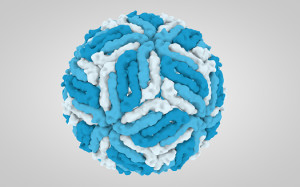 The Zika virus is a single stranded RNA virus of the Flaviviridae family transmitted primary by Aedes mosquitoes, although other modes of transmission are possible including mother-to-child, sexual and blood transfusions. The virus is usually self-limiting with symptoms similar to dengue and chikungunya, and work is on-going to establish a link between the virus and congenital defects including microcephaly. In a recent article published in Science, researchers sequenced seven Zika genomes from cases in Brazil including isolates from a blood donor and a newborn with microcephaly. Phylogenic and molecular clock data support the notion that the American strains of Zika virus share a common ancestor with strains from French Polynesia. Furthermore, data suggest that the Brazilian epidemic was started from a single infection between May and December 2013, at least one year before the virus was first identified in Brazil. Data suggest that other factors besides amino acid changes in the virus are important for pathogenesis which may including past and present infections with other viruses and/or human genetic predisposition. A recently updated AABB Association Bulletin on Zika virus assists AABB members who are collecting blood in locations not currently infected with Zika to alter the donor history questionnaire and comply with recommendations to defer donors for four weeks for possible Zika virus exposure.
The Zika virus is a single stranded RNA virus of the Flaviviridae family transmitted primary by Aedes mosquitoes, although other modes of transmission are possible including mother-to-child, sexual and blood transfusions. The virus is usually self-limiting with symptoms similar to dengue and chikungunya, and work is on-going to establish a link between the virus and congenital defects including microcephaly. In a recent article published in Science, researchers sequenced seven Zika genomes from cases in Brazil including isolates from a blood donor and a newborn with microcephaly. Phylogenic and molecular clock data support the notion that the American strains of Zika virus share a common ancestor with strains from French Polynesia. Furthermore, data suggest that the Brazilian epidemic was started from a single infection between May and December 2013, at least one year before the virus was first identified in Brazil. Data suggest that other factors besides amino acid changes in the virus are important for pathogenesis which may including past and present infections with other viruses and/or human genetic predisposition. A recently updated AABB Association Bulletin on Zika virus assists AABB members who are collecting blood in locations not currently infected with Zika to alter the donor history questionnaire and comply with recommendations to defer donors for four weeks for possible Zika virus exposure.
References
